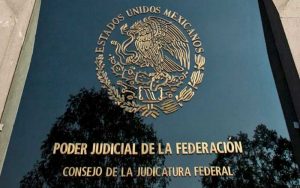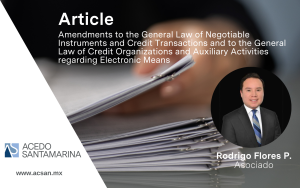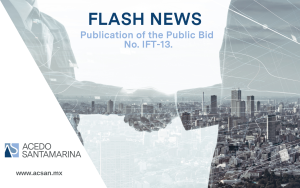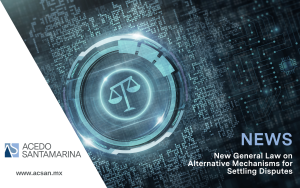
By means of General Agreements 8/2020 and 9/2020, the Plenary of the Federal Judiciary Council announced the measures to be observed during the period from May 6 to 31, 2020, which were adopted with the purpose of reestablishing the activities of the organs of the Federal Judiciary in the context of the sanitary contingency generated by the COVID-19 virus. These measures are as follows:
Processing and resolution of urgent cases.
New matters that are considered urgent may be promoted physically or through the “online trial” using the electronic signature, i.e., the Certified Electronic Signature of the Federal Judiciary (“FIREL”) or the “e.firma” (formerly advanced electronic signature or “FIEL”).
The courts must give informal follow-up to cases that were classified as urgent when they were filed.
In the event that an urgent matter is physically filed, the judicial officers will encourage the parties to continue with its processing through the “online trial” to the extent possible.
Resolution of physically processed cases.
The resolution of cases that have been processed in person, in which only the issuance of the sentence or final resolution is pending, will be resumed.
Processing and resolution of cases conducted through the “on-line trial”.
The processing and resolution of the matters that prior to the beginning of the sanitary contingency had been promoted through the “online trial” will be reestablished, except those in which hearings are pending or proceedings that require the physical presence of the parties or the practice of personal notifications are pending.
Suspension of deadlines and terms.
Time limits and procedural terms shall not run, hearings shall not be held and proceedings shall not be carried out, in the case of: (i) applications, claims, appeals, lawsuits and proceedings in general, other than those mentioned above; and (ii) the filing of appeals against rulings and resolutions issued in physically processed cases.
Urgent cases.
General Agreement 8/2020 contains a non-exhaustive list of the matters that must be classified as urgent, among which are the exercise of criminal action with detainee, requests for search warrants and interception of private communications, qualification of detentions, committal for trial, extradition determinations, proceedings for the determination and execution of pre-release benefits and those derived from the Amnesty Law, appeals against determinations on alimony, appeals against determinations on precautionary measures in pre-release benefits and those derived from the Amnesty Law, proceedings for the determination and execution of pre-release benefits and those derived from the Amnesty Law, injunctions against determinations on alimony, injunctions against determinations on precautionary measures in cases of domestic violence, injunctions related to acts that affect the best interests of minors, precautionary measures in mercantile insolvency proceedings, and declarations of non-existence of a strike.
In general, the judge should qualify a matter as urgent, considering the following: (i) the human rights that are the subject of the proceeding, the importance of its possible violation, and the consequences that could derive from postponing its processing until the conclusion of the contingency; and (ii) the possible impacts on the access to economic and social rights of groups and populations in a special situation of vulnerability, such as rights related to their health.
Ordinary sessions of the Collegiate Circuit Courts.
The session lists will be published in a timely manner on the Portal of the Federal Judiciary Council.
The sessions will be held without the presence of the public, remotely, by videoconference, and will be stored and safeguarded for later consultation.
The sense and observations of each Magistrate, as well as the characteristics of the session shall be recorded in the minutes.
The parties will be able to consult the record of the session once the corresponding resolution has been notified.
Attention to criminal cases in addition to urgent cases.
In matters that are not classified as urgent, the courts shall: (i) attend to decisions that do not require hearings, (ii) attend to decisions that require hearings, involving danger to the life or integrity of persons, by means of videoconferencing, (iii) attend to matters whose processing is integrated for resolution; and (iv) to carry out the procedural actions that may be decided in writing and that allow the resolution of enforcement proceedings.
Examples of these cases are: requests for provisional release on bail and injunctions in which the seizure of real estate that constitutes the home of the plaintiff is claimed.





